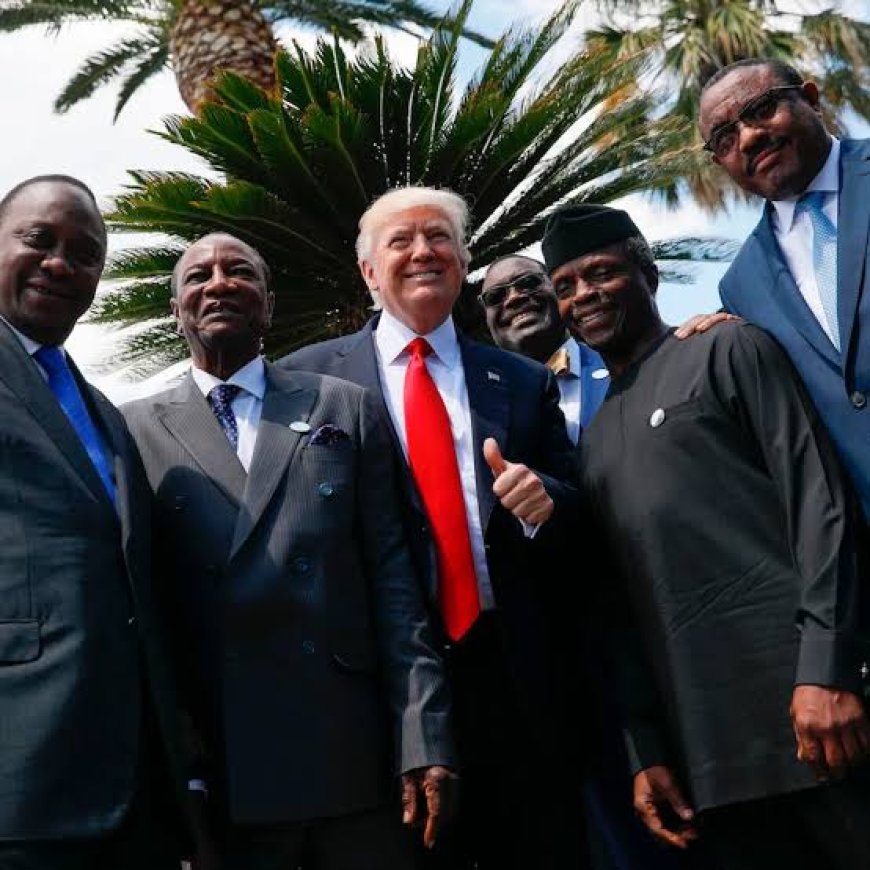How Trump's Presidency could reshape US's Foreign Policy with Africa

Nairobi,
Friday, 15 November, 2024
McCreadie Andias
Donald Trump’s presidency has always been defined by a transactional approach to international relations, preferring deals and concrete benefits over what he saw as nebulous ideals or entangling commitments.
As he prepares for his second term after a landmark victory over Kamala Harris, many are examining how a new Trump administration might reshape U.S. foreign policy towards the Global South, especially Africa.
His first term’s foreign policy was marked by a “America First” ethos, which often clashed with traditional diplomatic norms, a pattern likely to continue as he returns to the White House.
The implications for Africa under Donald Trump will mark a critical turning point in U.S.-Africa relations.
A Legacy of Indifference?
During Trump’s first tenure, his administration's engagement with Africa was often criticized for its lack of coherence and depth. Unlike his predecessors, who crafted continent-spanning programs like George W. Bush’s President’s Emergency Plan for AIDS Relief (PEPFAR) or Barack Obama’s Power Africa, Trump’s Africa policy seemed inconsistent and unfocused.
He infamously referred to certain African nations in derogatory terms, spurring diplomatic backlash and setting a confrontational tone. In practical terms, aid cuts and reduced diplomatic engagement characterized U.S.-Africa relations.
However, the Trump administration did engage with the continent on certain fronts. The Prosper Africa initiative, launched in 2019, sought to double two-way trade and investment between the United States and African countries. The policy was emblematic of Trump's economic pragmatism: a move towards less traditional development aid and more trade-driven engagements.
By reducing regulatory barriers for U.S. companies and encouraging business partnerships, the administration sought to counter China's growing influence in the region.
Under his second Term, Prosper Africa could see a renewed emphasis, marking a shift towards strategic economic engagements driven by the potential of African markets rather than humanitarian need alone.
Security and Stability: A Continued Focus on Extremism
Security policy during Trump's first term was heavily oriented around counterterrorism. He described Africa primarily through the lens of security threats, such as Boko Haram in Nigeria, al-Shabaab in Somalia, and other extremist factions operating across the Sahel.
This led to policies focused on military engagements, as seen through drone strikes, military partnerships, and U.S. troop deployments across Africa. Trump was notably hesitant to invest further in prolonged military engagements, reflecting his broader reluctance for costly overseas commitments.
In his second term, this focus on counterterrorism is likely to continue, albeit through “cheaper” means such as drone-based surveillance and targeted military actions. Trump’s aversion to nation-building and capacity-building projects means that any renewed focus on security will likely be limited to narrow, cost-effective measures.
For many African nations, this could translate to increased security aid with fewer strings attached, but also the risk of policies driven by short-term strategic interests rather than a long-term vision for stability.
Reducing U.S. Footprints in Multilateralism
Trump’s disdain for multilateral institutions, which he often viewed as arenas that hamstrung U.S. freedom and burdened its taxpayers, would likely continue to shape his approach to Africa.
The African Union, regional coalitions, and U.N. peacekeeping missions in which African states participate might experience a cooling of U.S. engagement and support under Trump's presidency.
This retrenchment could have a domino effect, as waning U.S. influence might embolden rival powers such as China and Russia, which have used such openings to assert themselves as alternatives to Western dominance.
While Trump viewed development aid skeptically, his administration could instead intensify direct bilateral agreements with strategically valuable nations like Kenya, Nigeria, and Egypt.
By tailoring deals that reinforce U.S. interests in exchange for trade or limited security guarantees, Trump's policies could lead to a “cherry-picking” approach where U.S. influence is highly concentrated but less diffuse.
Immigration, Health, and Diplomacy
In his first term, Trump's immigration policies were marked by travel bans targeting predominantly Muslim countries, including several in Africa. Trump's policies may continue to emphasize strict border controls and restrictive immigration measures, complicating efforts to foster positive relations with African countries.
This hardline stance could have social and economic implications, limiting opportunities for African students, entrepreneurs, and professionals seeking opportunities in the U.S.
Conversely, health initiatives under Trump’s administration demonstrated a notable contrast with certain trends. Despite his broader isolationist tendencies, he continued U.S. support for PEPFAR. His second term might see health-related initiatives remain relatively insulated from his overarching skepticism towards aid, particularly if framed as strategic investments or as protections against pandemics that might spread globally. However, the tenor and language of engagement could impact their effectiveness and diplomatic goodwill.
Balancing Against Chinese and Russian Influence
Trump’s concern over Chinese and Russian influence globally was evident during his tenure. This challenge is particularly pronounced in Africa, where China has emerged as a formidable player in development, infrastructure financing, and diplomatic outreach.
Trump's focus on countering China’s influence could lead to more competitive trade policies and investments targeting African economies. This strategic rivalry may ultimately benefit African nations if it results in favorable terms and investments, though it risks reinforcing dependency dynamics and prioritizing U.S.-China competition over Africa’s self-determined growth.
The Prospects of a Trump Doctrine in Africa
While many anticipate that Trump’s foreign policy with Africa will be guided by pragmatism, it remains to be seen whether a clear doctrine could emerge beyond “America First.”
His second administration could accelerate the transition from traditional aid-driven diplomacy to transactional relationships based on strategic interests. Such an approach could see the U.S. attempt to dominate key economic sectors in Africa, build flexible military coalitions, and selectively engage with regional governments based on their strategic value.
In a world increasingly defined by geopolitical competition, Trump's return to the Oval office might bring Africa’s significance in U.S. foreign policy to the fore, but primarily as a chess piece in broader global rivalries.
Whether this approach would ultimately benefit African nations or exacerbate old tensions remains a critical question for policymakers on both sides of the Atlantic.
What's Your Reaction?


































































































































































































































































































